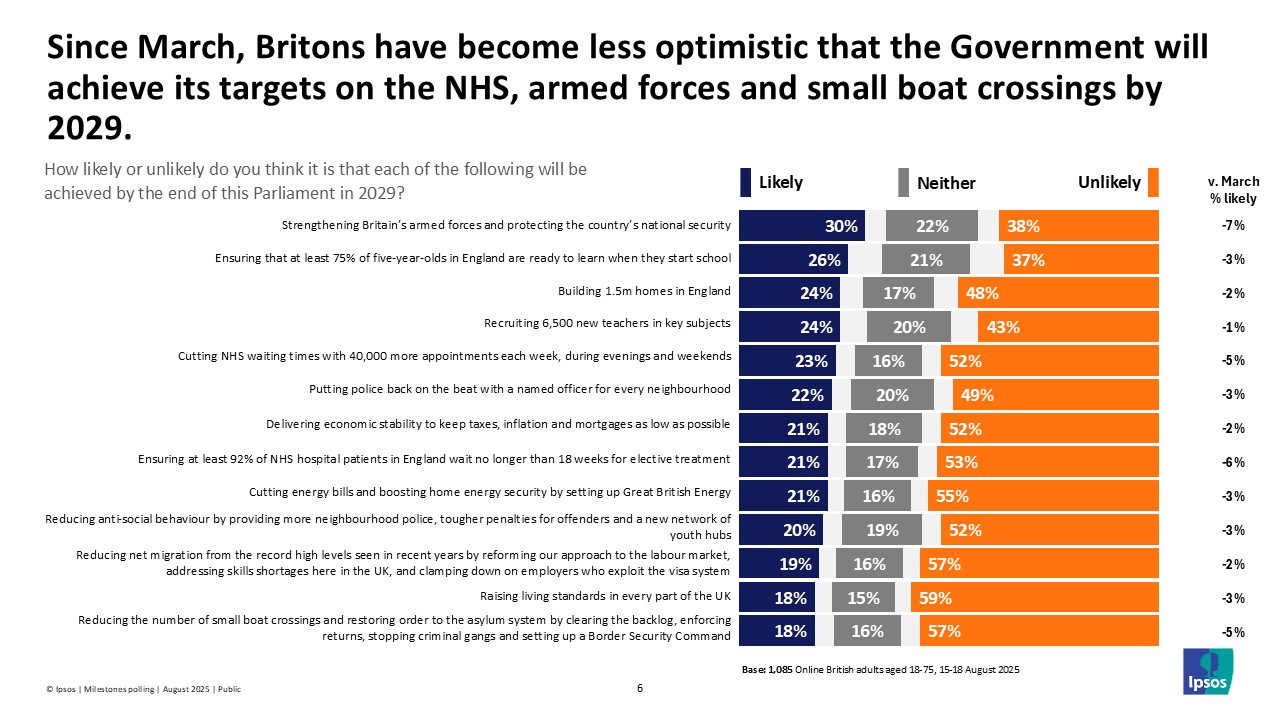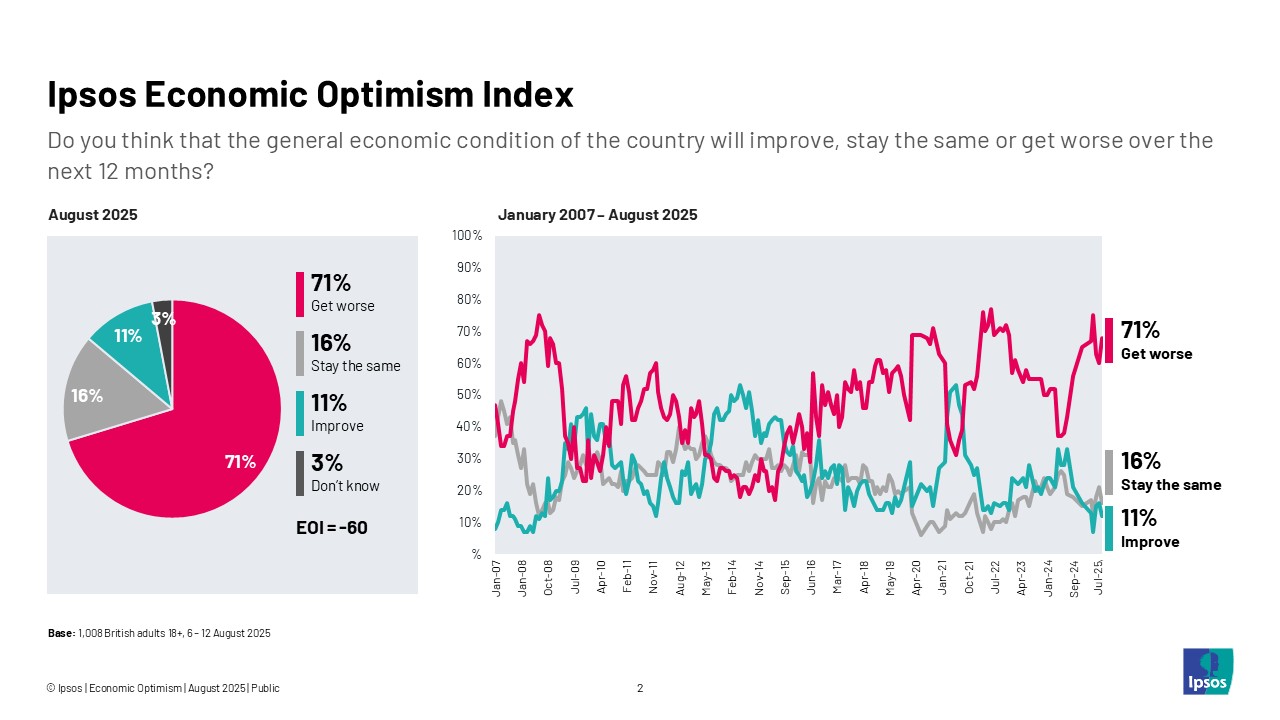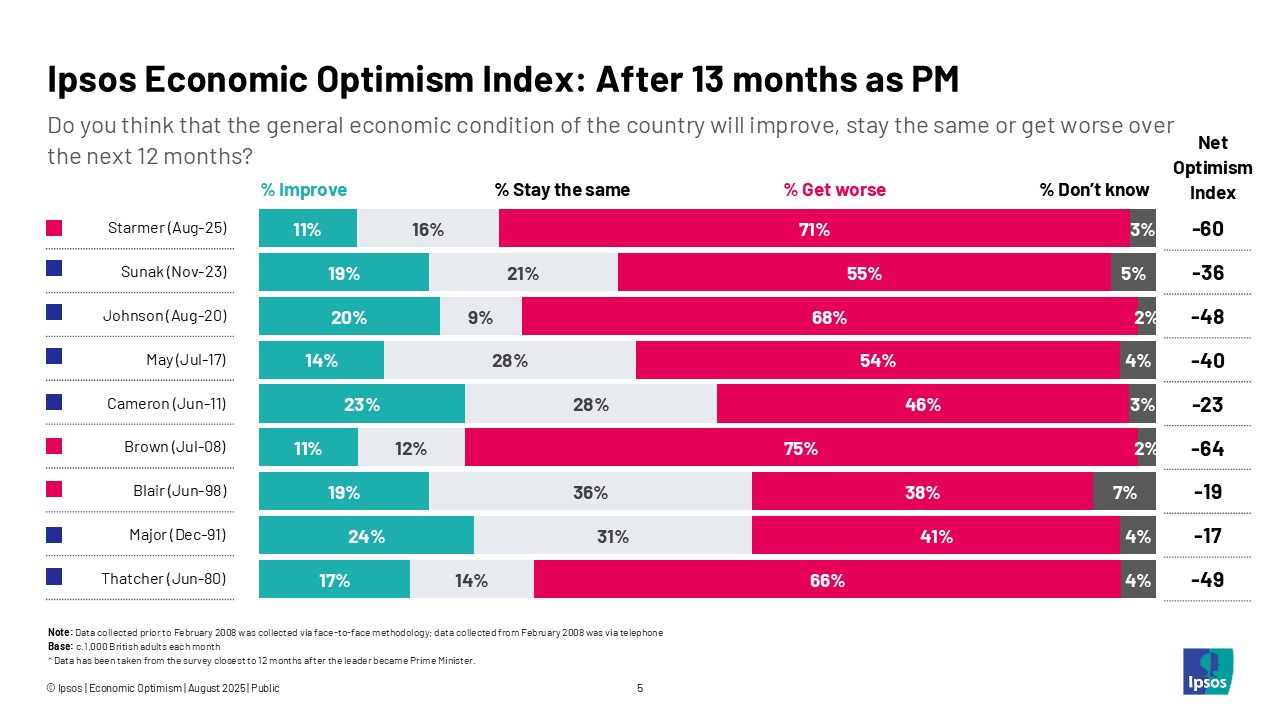Public priorities on NHS, economy and bills clash with scepticism over government delivery, new Ipsos poll finds
The British public remains focused on core issues around the cost of living/economy, NHS waiting times and small boat crossings, with new polling from Ipsos showing that reducing NHS waiting times and cutting energy bills are the top two concerns for the country from the government’s list of milestones and priorities. However, the research also reveals significant public pessimism about the Labour government's ability to deliver on these and other key milestones by the end of the current Parliament. In addition, the Ipsos Economic Optimism Index reveals that widespread pessimism about the state of the British economy continues to persist.
Key findings - milestones
- The economy/cost of living, NHS waiting times and small boat crossings continue to dominate public agenda: Cutting NHS waiting times continues to be the public’s top priority (56%) among the government’s milestones and priorities, followed closely by cutting energy bills and boosting home energy security (53%). The public’s top five priorities are rounded up by raising living standards (51%), delivering economic stability (51%) and elective care waiting lists (50%), closely followed by reducing small boat crossings (47%). These have remained the public’s top concerns since March 2025, indicating a sustained focus on kitchen-table issues.
- Negative ratings on government performance: Despite these being public priorities, the government receives negative net satisfaction ratings across all thirteen milestones tested. The public is most critical of the government’s handling of some of their main concerns around the economy/living standards and immigration, with the majority saying the government is doing a bad job on "Reducing the number of small boat crossings" (58%), "Reducing net migration" (55%), “Raising living standards" (58%)and "Cutting energy bills" (55%).

- Optimism that the government will achieve some of its key milestones has fallen: There is widespread doubt that the government will achieve its stated goals by the end of this Parliament in 2029. The public is most sceptical about the government’s ability to raise living standards and reduce small boat crossings, with only 18% each believing these goals are likely to be achieved. The biggest drops in public confidence since March are for "Strengthening Britain’s armed forces" (down 7 ppts to 30% likely), "Ensuring at least 92% of NHS hospital patients in England wait no longer than 18 weeks for elective treatment" (down 6 points to 21% likely), “Cutting NHS waiting times with 40,000 more appointments” (down 5ppts to 23% likely) and “Reducing the number of small boat crossings and restoring order to the asylum system” (down 5ppts to 18% likely).

- Partisan divide in expectations: While Labour’s 2024 voters are more optimistic than the general public, especially on national security, NHS waiting times and education, their confidence is not absolute. Even among its own supporters, there is significant doubt on key pledges, with only 29% believing the government will raise living standards and 28% thinking it will reduce small boat crossings. Conversely, Conservative and Reform UK voters show deep pessimism, with fewer than one in ten Reform voters believing the government will succeed on raising living standards or tackling small boat crossings.
Economic Optimism Index

Ipsos’ Economic Optimism Index asks Britons whether they think the general economic condition of the country will improve, stay the same, or get worse over the next twelve months, and has been tracking the economic mood of Britons since 1978. Fieldwork for this month’s data was collected from the 6-12 August.
The latest results show 11% think the economy will improve, and 71% think it will get worse, giving a net Ipsos Economic Optimism Index figure of -60 (slightly down from -56 in July). 16% think there will be no change.
The level of net economic optimism today is the second lowest faced by any PM surveyed at this stage of their premiership (thirteen months in). This month’s figure of -60 is ahead of only the -64 recorded thirteen months into Gordon Brown’s premiership in July 2008, in the early stages of the economic crisis.

Commenting on the findings, Gideon Skinner, Senior Director of UK Politics at Ipsos, said:
Keir Starmer recently said his government is now moving to its next phase where it will focus on ‘delivery, delivery, delivery’, but this latest data shows he is right to recognise voters frustration with the pace of change so far, The public has a very clear and consistent set of priorities, centred on the cost of living, the economy and the state of the NHS – alongside concerns about small boats crossings. Yet these are areas where they are not only giving the government poor marks for its current performance but are also pessimistic about its chances of long-term success. While Labour voters still show some faith, particularly on the NHS, early years and national security, even their confidence is shaky on crucial issues like immigration and improving living standards. With a long road to 2029, these findings underscore the scale of the task the government faces to convince the public it can deliver on its core promises - though it still has time on its side.
Technical note:
- For the milestones polling, Ipsos interviewed a representative sample of 1,085 adults aged 18-75 across Great Britain. Polling was conducted online between the 15th-18th August 2025.
- For the Economic Optimism Index polling, Ipsos interviewed a representative sample of 1,008 adults aged 18+ across Great Britain. Polling was conducted by telephone between the 6-12 August 2025.
- Data are weighted to match the profile of the population. All polls are subject to a wide range of potential sources of error.




